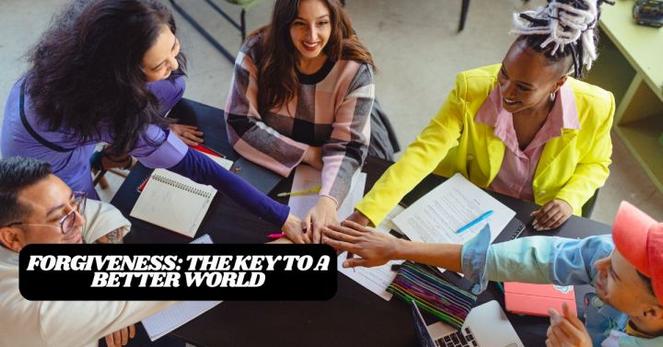Is Your Faith in the True Christ? A Wake-Up Call
This powerful message confronts us with the reality of our faith and the risks of believing in a distorted gospel. Let's explore the importance of knowing the true Christ and the urgency of returning to the teachings of the early church. #TrueChrist #GospelTruth #FaithAwakening #SpiritualJourney #Christianity #EternalSalvation #BiblicalTeachings #EarlyChurch #FaithReflection #ChristianLeadership from Christic Academy
https://christicacademy.wordpress.com/2025/03/19/is-your-faith-in-the-true-christ-a-wake-up-call/
In a world marked by division, conflict, and unresolved grudges, one simple act has the power to heal wounds and bridge divides: forgiveness. Whether it’s forgiving a family member for a long-past hurt or moving beyond national and cultural conflicts, the ability to let go of resentment is a powerful force that could transform not only our personal relationships but the world as a whole. Yet, forgiveness is often misunderstood. It’s not about excusing wrongdoing or pretending pain doesn’t exist; it’s about choosing peace over anger, and understanding over retribution.
Imagine a world where forgiveness was a daily practice, not a rare event. The peace we seek might be closer than we think.
What is Forgiveness?
At its core, forgiveness is a conscious decision to release feelings of resentment or revenge toward someone who has harmed you, regardless of whether they deserve it. It’s a choice to let go of the pain, even if the offense remains. According to the Bible, forgiveness is central to a life of compassion and mercy. In Ephesians 4:32, the apostle Paul instructs us to “be kind and compassionate to one another, forgiving each other, just as in Christ God forgave you.” This kind of forgiveness is not just for the benefit of others, but for our own well-being and peace.
Why Forgiveness Matters
Forgiveness isn’t just a moral imperative; it’s a necessity for our emotional, psychological, and spiritual health. Here are some of the most profound ways forgiveness can change lives:
For the Individual: Studies show that forgiveness can significantly reduce stress, anxiety, and depression. Holding onto anger and bitterness can weigh us down, making it difficult to enjoy life and find inner peace. Forgiving allows us to free ourselves from the burden of past hurts.
For Relationships: When we forgive, we open the door for reconciliation. While reconciliation may not always be possible, forgiveness allows us to heal and move forward, whether the relationship continues or not. It can mend friendships, marriages, and familial bonds that have been damaged by misunderstandings or conflict.
For Society: Imagine how much more peaceful communities and nations could be if we practiced forgiveness more often. Think of the countless political and racial conflicts that might be resolved if parties were willing to let go of past grievances and approach each other with empathy and understanding. Forgiveness fosters unity, allowing societies to grow beyond their divisions.
Forgiveness in the Bible
The Bible is rich with stories and teachings on forgiveness. Jesus’ response to Peter in Matthew 18:21-22 is particularly striking: when Peter asks how many times he should forgive someone, Jesus responds, “I tell you, not seven times, but seventy-seven times.” In other words, forgiveness should have no limits.
One of the most powerful examples is the story of Joseph in the Old Testament. After being sold into slavery by his own brothers, Joseph rose to power in Egypt and had every reason to seek revenge. Instead, he chose to forgive them, saying, “You intended to harm me, but God intended it for good” (Genesis 50:20). Joseph’s forgiveness not only restored his family but paved the way for future blessings.
In the New Testament, Jesus models the ultimate act of forgiveness, even in His most painful moments. As He was being crucified, He prayed for His executioners, saying, “Father, forgive them, for they do not know what they are doing” (Luke 23:34). This extraordinary display of forgiveness shows us the depth of God’s mercy and love.
God’s Forgiveness:
1 John 1:9: “If we confess our sins, he is faithful and just to forgive us our sins and to cleanse us from all unrighteousness.”
Psalm 103:12: “As far as the east is from the west, so far has he removed our transgressions from us.”
Forgiving Others:
Matthew 6:14-15: “For if you forgive other people when they sin against you, your heavenly Father will also forgive you. But if you do not forgive others their sins, your Father will not forgive your sins.”
Ephesians 4:32: “Be kind and compassionate to one another, forgiving each other, just as in Christ God forgave you.”
Jesus’ Teachings on Forgiveness:
Matthew 18:21-22: “Then Peter came to Jesus and asked, ‘Lord, how many times shall I forgive my brother or sister who sins against me? Up to seven times?’ Jesus answered, ‘I tell you, not seven times, but seventy-seven times.'”
Luke 6:37: “Do not judge, and you will not be judged. Do not condemn, and you will not be condemned. Forgive, and you will be forgiven.”
Parable of the Unforgiving Servant:
Matthew 18:23-35: This parable illustrates the necessity of forgiving others as God has forgiven us, showing the consequences of an unforgiving heart.
These passages reflect the central Christian teaching that forgiveness is a divine act that believers are called to emulate in their relationships with others.
The Power of Forgiveness in a Divided World
Today’s world is full of divisions—whether political, racial, or cultural. What if forgiveness was the first step toward healing these deep fractures? The example of Nelson Mandela, who forgave his oppressors after years of unjust imprisonment, is a modern-day testament to the transformative power of forgiveness. His choice to embrace reconciliation rather than revenge helped lead South Africa toward healing after apartheid.
On a smaller scale, families, communities, and workplaces can be transformed by forgiveness. When people are willing to let go of grudges and offer second chances, it creates a ripple effect, promoting an atmosphere of peace, understanding, and collaboration.
How to Practice Forgiveness
Forgiveness is often easier said than done, especially when the wounds are deep. Here are some practical steps to help you on your journey to forgive:
Acknowledge the Pain: Forgiving doesn’t mean pretending that the hurt didn’t happen. It’s important to recognize and validate the pain before you can move forward.
Make the Choice to Forgive: Forgiveness is a decision, not a feeling. You won’t always “feel” ready to forgive, but making the conscious choice to let go is the first step.
Empathy and Perspective: Try to see the situation from the other person’s perspective. This doesn’t mean excusing their behavior, but understanding their motivations can make forgiveness easier.
Allow Time: Forgiveness is a process. It may not happen overnight, and that’s okay. Be patient with yourself as you work through your emotions.
Forgiveness is Not Weakness
One of the biggest misconceptions about forgiveness is that it’s a sign of weakness. In reality, it takes incredible strength to forgive someone who has wronged you. Forgiveness doesn’t mean allowing others to hurt you repeatedly. It’s about setting healthy boundaries while freeing yourself from the burden of bitterness. Forgiving someone can actually be one of the most empowering choices you can make.
Imagine a World Full of Forgiveness
Picture what the world could look like if we all forgave more. Nations might resolve conflicts more peacefully, communities would heal from long-standing divisions, and personal relationships could be restored. Instead of letting past hurts define our lives, we could choose to move forward with hope and compassion.
In a world full of challenges and conflicts, forgiveness offers a path to peace. It allows us to move beyond our pain, build bridges instead of walls, and find healing in our own hearts and in our relationships with others.
The power to forgive is within all of us. Whether we’re forgiving a family member, a friend, or even ourselves, each act of forgiveness brings us one step closer to a more compassionate, peaceful world. It’s not just about healing the past—it’s about building a brighter future. Let forgiveness be the foundation on which we build that future, one act of mercy at a time.
Share this:
https://head2toemag.com/forgiveness-the-key-to-a-better-world/
#magamikejohnson #MAGAMike podcast #truthbetold 2 weeks ago, does a #micdrop
The most important #christian #biblicalteachings #biblical belief is to have compassion for yourself and especially to your neighbors and strangers.
⭕BUT, the government is not them, the law has nothing to do with #compassion (the Bible says so)
⭕️
Religious kindness is not applicable to the laws
LISTEN at the 29min min point episode 68 (it seems epi 69 is his last, because he became #speakerofthehouse)
Suggestion:
Maybe he could inform students that he is not allowed to inform them of that.
Then right after that, add his personal opinions on the sensibility of not knowingly spreading ANY diseases, and preach how not coming to class sick (with anything) is more Biblically in line with #WWJD -- "Do unto others" means "don't make the rest of us sick."
Maybe by making it relevant to diseases in general, instead of #Covid specifically, AND by incorporating #BiblicalTeachings, he can get around their rule.
#TheGoldenRule #Covid #Covid19 #School #Education #Teaching #Classrooms
Religious caller vs James O'Brien on homosexuality and the Bible | LBC







